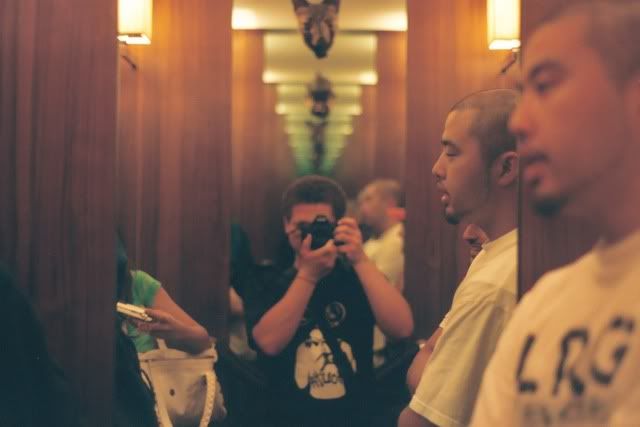The Queen, or, more appropriately, How Tony Blair Saved the Monarchy, is an interesting look into the inner-workings of the British government and Royal Family in the week after the death of Princess Diana. The audience gains entry to the previously guarded Royal Family life and its interactions with Number 10 Downing Street. Dry humor, great acting, and an original premise make for an interesting, though not perfect, film.
The movie starts out with Tony Blair (Michael Sheen) winning the prime minister election and meeting the queen for the first time. Soon, the Royal Family receives word that Diana has died in a car accident and they soon find themselves in the midst of political turmoil. Blair finds himself thrust into the whole thing when the Family fails to agree on how things should be handled and the public begins to take notice. Blair finds himself working to keep the British people happy, while at the same time preventing Queen Elizabeth II (Helen Mirren) from committing political suicide in a new society that she doesn't understand, before he is even sworn in.
With The Queen, Stephen Frears does a great job of humanizing the UK politicos and royalty that make up the cast. Showing these people on the news or in print distances them from the normal people of the world. They seem like they are just pictures and words, speeches and policy. Most of the time, when powerful people are depicted on screen, the closest the filmmaker comes to showing them as real human beings is to depict them as bumbling idiots, ala American Dreamz. Frears takes a different tact. While he does depict Her Majesty's moments of indecision, stubbornness, and weakness, her moments of strength and the reasons behind that stubborn indecisiveness are also shown. She is shown doing things, such as breaking down in a car, that most people would never even associate with the Queen of England. Frears never insults his characters with the kind of one-sided characterization found in many films, and that is very refreshing.
Stylistically, the film is average. It relies very heavily on reaction shots and there are a few scenes where the cutting could have been slowed down. A lot of the cinematography is very good, especially the shots of the Balmoral Estate. Altogether, the cinematic technique is functional, but nothing to be beholden to. Simple Classical Hollywood Style doing its unobtrusive job. Obviously, Frears was only looking for utilitarian functionality, so complaining about it would be a little out of line.
The combination of wit, good writing, and interesting characters make The Queen a great entry in the Frears canon. However, it's not the kind of movie that is worthy of the praise it has received. It is a good film, but not magnificent. It occasionally drags and doesn't push very hard on the cinematic technique side. However, it is enjoyable and sheds a new light on this normally cloistered group, making it well worth the watch.
The movie starts out with Tony Blair (Michael Sheen) winning the prime minister election and meeting the queen for the first time. Soon, the Royal Family receives word that Diana has died in a car accident and they soon find themselves in the midst of political turmoil. Blair finds himself thrust into the whole thing when the Family fails to agree on how things should be handled and the public begins to take notice. Blair finds himself working to keep the British people happy, while at the same time preventing Queen Elizabeth II (Helen Mirren) from committing political suicide in a new society that she doesn't understand, before he is even sworn in.
With The Queen, Stephen Frears does a great job of humanizing the UK politicos and royalty that make up the cast. Showing these people on the news or in print distances them from the normal people of the world. They seem like they are just pictures and words, speeches and policy. Most of the time, when powerful people are depicted on screen, the closest the filmmaker comes to showing them as real human beings is to depict them as bumbling idiots, ala American Dreamz. Frears takes a different tact. While he does depict Her Majesty's moments of indecision, stubbornness, and weakness, her moments of strength and the reasons behind that stubborn indecisiveness are also shown. She is shown doing things, such as breaking down in a car, that most people would never even associate with the Queen of England. Frears never insults his characters with the kind of one-sided characterization found in many films, and that is very refreshing.
Stylistically, the film is average. It relies very heavily on reaction shots and there are a few scenes where the cutting could have been slowed down. A lot of the cinematography is very good, especially the shots of the Balmoral Estate. Altogether, the cinematic technique is functional, but nothing to be beholden to. Simple Classical Hollywood Style doing its unobtrusive job. Obviously, Frears was only looking for utilitarian functionality, so complaining about it would be a little out of line.
The combination of wit, good writing, and interesting characters make The Queen a great entry in the Frears canon. However, it's not the kind of movie that is worthy of the praise it has received. It is a good film, but not magnificent. It occasionally drags and doesn't push very hard on the cinematic technique side. However, it is enjoyable and sheds a new light on this normally cloistered group, making it well worth the watch.
powered by performancing firefox

No comments:
Post a Comment